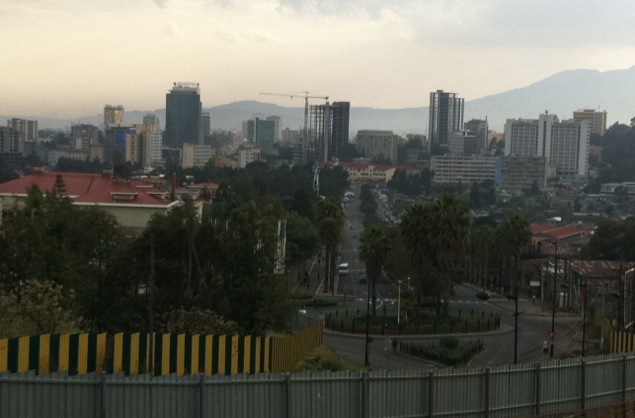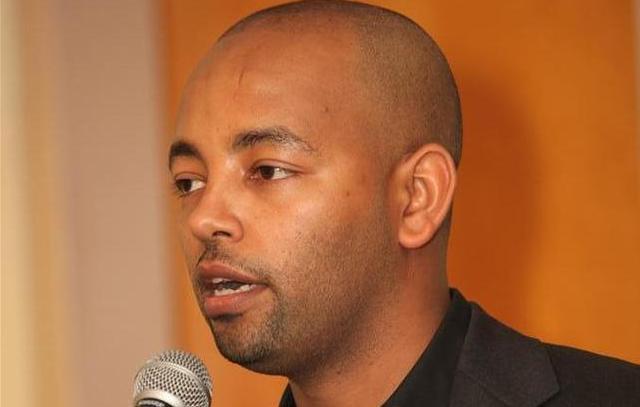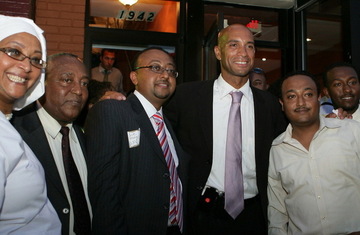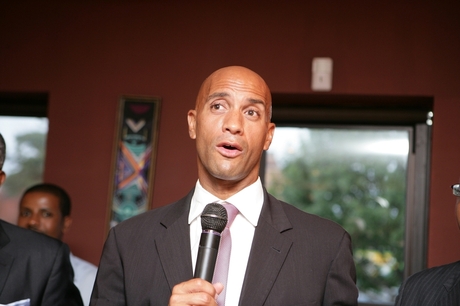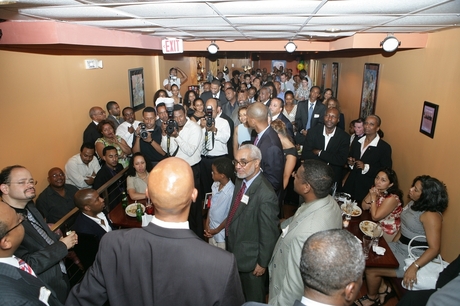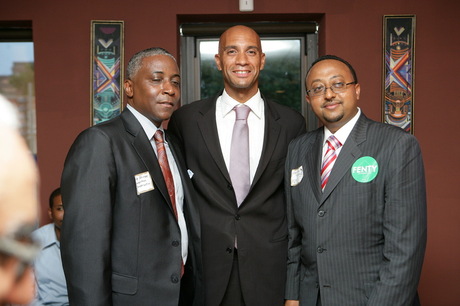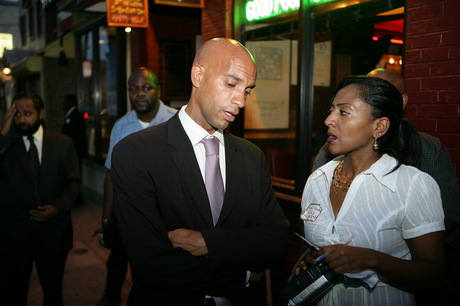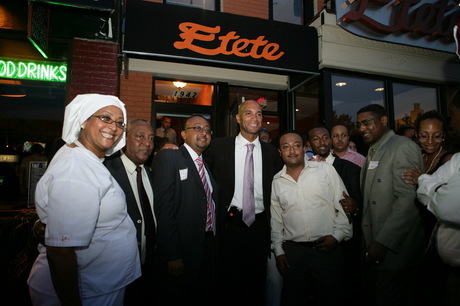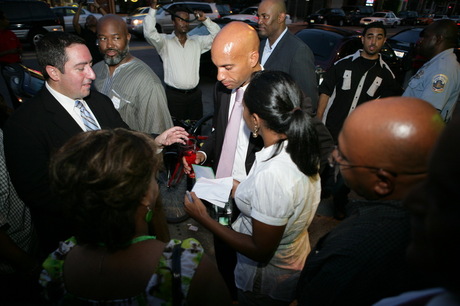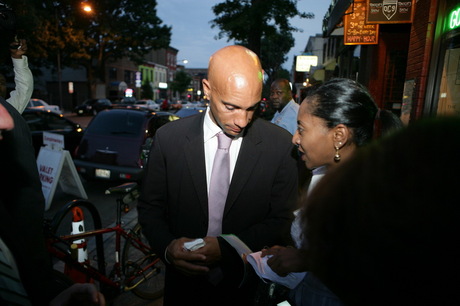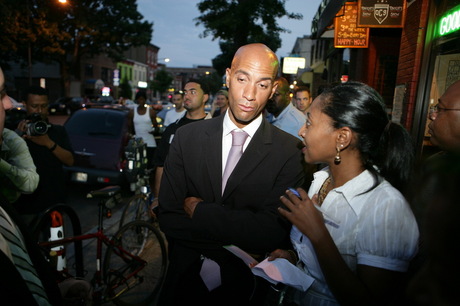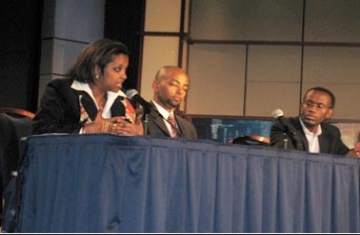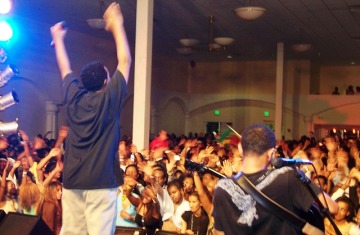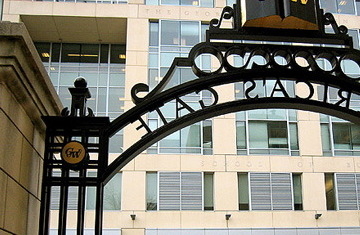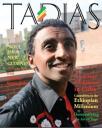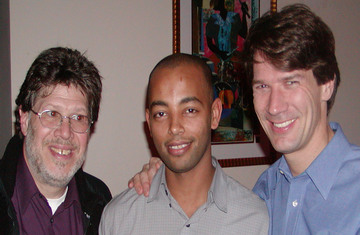 Photo taken in 2004 when Henok left the Brooklyn Chamber of Commerce. To the left and right of him, the president and vice president of the chamber at the time respectively.
Photo taken in 2004 when Henok left the Brooklyn Chamber of Commerce. To the left and right of him, the president and vice president of the chamber at the time respectively.
Tadias Maagazine
By Liben Eabisa
New York (TADIAS) – We recently received a press release from Addis Ababa by Precise Consult International (PCI), a business consulting group managed by Henok Assefa, a former Director of iBrooklyn, the flagship home site of the Brooklyn Chamber of Commerce.
PCI organized (with financial support from The World Bank, USAID, and The Embassy of the Netherlands) the first annual Ethiopian Diaspora business conference, which took place in Addis Ababa on September 19, 2007 at the UNECA conference center.
In the press release sent to Tadias Magazine, the group announced that it has partnered with Access Capital Services, a local Ethiopian investment firm (founded by a former member of the New York Wall Street Ethiopian community), to offer attractive equity investment opportunities to the Ethiopian Diaspora.
We reached Henok Assefa, Managing Partner at PCI, at his office in Addis Ababa
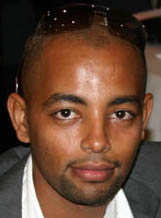
(Photo: Henok Assefa)
Tadias: Henok, where in New York did you grow up and when did you move to Ethiopia?
Henok: How’s it going in Harlem, Tadias? How is the best city in North America treating you all these days?
You know I was always meant to be a New Yorker. Even in Addis, I grew up around Arada Giorigis (piazza) or more specifically Dejach Wube Sefer (Wube Bereha) which is like the New York of Ethiopia.
In New York, I spent most of my years in the Bronx and Manhattan. I did both my first and second degrees at Fordham University in the Bronx. I also spent a considerable amount of time working in Brooklyn. I have a special attachment to New York as it has given me so much and helped to create the person I am today. Everyone who knows me expects me to visit the city at least twice a year. I never seem to be able to stay away for too long. New York is in my blood.
By the way, I want to take this opportunity to say hello to all my friends and family in New York….and of course, big up to Brooklyn and the Boogie Down Bronx!
Tadias: We understand that you were quite an athlete while growing up in New York. Or are you still an athlete?
Henok: I did well enough in Athletics. In addition to teaching me so much about discipline and team work, Athletics scholarship actually got me through college and graduate schools. I ran Division I track and field and cross country for Fordham University where I finished off my career as captain of both teams. I no longer compete. However, I have hardly been out of shape for more than a month since 1992. Luckily, Addis Ababa now has some really high class gyms and I manage to stay in shape. It is a way of life for me.
Tadias: Your company organized the the first annual Ethiopian Diaspora business conference. How did that go?
Henok: It was phenomenal! The conference exceeded our expectations in many ways. We packed up the UN Conference Center and there took place a genuine and very sophisticated discussion. Ethiopians from virtually everywhere in the World were in the audience and they wanted to hear about doing business in Ethiopia from those that are already doing it on the ground. They were certainly not disappointed.
Our panelists, all of whom had enjoyed high levels of success in corporate America and Canada were there sharing their business experience in a land much less developed but offered many opportunities nevertheless. Between Ermyas Amelga, Tadiwos Belete, Yoseph Kibur, and Mohammed Umer, these guys were responsible for the direct creation of almost 2000 jobs. In addition, as outspoken leaders in their respective industries, the dynamism the four are bringing into the Ethiopian economy is incalculable. It was clear that the audience left seriously inspired and we felt that it was truly history in the making.
But we didn’t simply leave the audience inspired. We wanted to start planting some business ideas in them. In the afternoon, we had interesting presentations from the Ethiopian Investment Commission, the Privatization Agency, and USAID’s Agribusiness development program.
We have since committed ourselves to keeping the Ethiopian Diaspora well informed of business opportunities in Ethiopia that offer reasonably high returns while helping the country to grow.
Tadias: We hear that you have partnered with Access Capital to do even bigger things. Tell us about Access Capital and your new project with them.
Henok: As a development and business consultancy, we at PCI have great faith in the potential that exists within the global Diaspora community (we call it Greater Ethiopia) to help change Ethiopia for the better.
There are 1-2 million of us overseas and pretty much all of us are die hard well wishers for our country. After doing months of studies, we have concluded that there are about four very effective ways for the Diaspora to contribute economically to the country while making money at the same time. These are through remittances, direct investments, importing Ethiopian products, and by making equity investments in local companies. We are partnering with Access Capital precisely because it offers the latter mechanism.
Set up by a former member of the New York Wall Street Diaspora, Access Capital Services is a local finance advisory and investment firm which helps companies raise capital to take advantage of investment opportunities in different sectors of the Ethiopian economy. In essence, it is helping to build well capitalized and globally competitive Ethiopian businesses based on well crafted business plans. What is unique and pioneering about Access Capital is that the companies it advises raise their capital by selling shares to the public. Outside of the banking and insurance industries, this does not happen very much in Ethiopia.
Most businesses here are weak and under capitalized because they lack precisely the mechanism Access Capital offers to raise equity. On the other hand, there is something close to 50 billion birr in the vaults of local banks. The public is keeping all this money in the banks, earning only 4% return in an environment with up to 20% inflation.
They are doing this because there are few safe opportunities in which they can invest to earn positive returns. Access capital is now helping to offer alternatives to simply keeping money in the bank.
Our partnership with Access Capital is simply designed to extend these equity investment opportunities to the Ethiopian Diaspora. We feel that much higher rates of return are possible by investing in Ethiopia’s emerging market than in stocks, bonds, and savings accounts in the West that yield very low single digit returns. The few share companies in Ethiopia today, the banks, regularly bring in return on investment (ROI) of 50 to 60% annually. But the best part is the knowledge that your money is now creating jobs and helping to build your country. This is why we’ve set up the website www.DiasporaInvest.com to keep everyone overseas informed of such opportunities.
Tadias: What exactly is the “emerging” equity market in Ethiopia? Give us specific examples.
Henok: It is actually a little known fact that Ethiopia had one of the earliest stock markets in Africa during the time of the Emperor. At the time, well capitalized share companies were built in the agriculture and other sectors and performed very well. Unfortunately, that era ended with the advent of communism in the 1970s.
Starting in the mid 90s, we started to see share companies being built in the banking and insurance industries even though there existed no stock market. Companies like Awash Bank and Dashen Bank have been turning in attractive returns for their shareholders ever since.
With the advent of Access Capital, you are now starting to see non-bank share companies. It appears also that this is slowly becoming a trend. A recent presentation by Access Capital on the launch of Access Real Estate Share Company (under formation) attracted over 1000 prospective investors.
There are other examples as well. For example, I just read in the paper today that Ato Abinet Gebremeskel, a close confidant of Sheik Al Amoudi, bought a big chunk of shares in East Africa Bottling, the company that produces Coca Cola in Ethiopia.
Tadias: We recently attended the meeting of the Abyssinian Baptist Church delegation to Ethiopia here in Harlem. Tadias actually did a story on it. At the meeting, they were talking about sending another delegation to Ethiopia soon. And interestingly, this time around, the group will be made up of business people looking for investment opportunities. We also had a discussion with a gentleman, an executive at BET, who told us that he was already in process to buy a house in the Old Airport area and starting a flower farm business with Ethiopian partners. So the question is: Are you targeting only and specifically the Ethiopian Diaspora? Or are you looking at the bigger pie?
Henok: Yes, I have followed the story on Tadias.com and also read about the members of the Abyssinian Baptist Church here in Addis. Unfortunately, I didn’t get the chance to meet with them. The African Union identifies African Americans as part of the greater African Diaspora. I think this is very appropriate. However, we are looking at things from an even bigger perspective.
You know what Ethiopia needs to develop economically is a dynamic productive sector that is well capitalized both financially as well as technologically. As a company, we have aligned our business objectives and services to help create and support such a productive sector.
In essence, we are also banking on the fact that Ethiopia will increasingly move in this direction thus creating more business opportunities for us. Therefore, even if our present immediate focus is specifically on the Ethiopian Diaspora, the services we are developing will serve anyone interested in doing business in or with Ethiopia. We are not only looking to attract and service our brothers and sisters in Harlem but also anyone looking to add value to the Ethiopian economy.
Tadias: What are the safeguards in place in terms of rules and regulations to assure safe investment and minimum red tape?
Henok: The Commercial Code of Ethiopia, produced during the time of the emperor, is a surprisingly well crafted piece of work that is still applicable today. It provides for the rules and regulations to oversee share companies. In addition, it is truly important that companies offering shares to the public have in place transparent and effective corporate governance structures.
Tadias: What is the minimum required to invest in these share companies?
Henok: It depends on the company that is offering shares. For example, the current offer by Access Capital is Access Real Estate Share Company. The minimum required investment is 25 shares or 25,000 birr payable in four installments over one year.
But it is also important to mention that there is maximum amount of shares one can buy which is 2000 shares. The idea is to make it hard for an individual or a group of people to control these share companies.
Tadias: How much money does the Ethiopian Diaspora send to family and friends in Ethiopia?
Henok: I have seen many different figures for this. However, the National Bank of Ethiopia figures suggest that the Diaspora annually sends in about USD $1 billion home. Of course, if you count in the money being transferred into the country unofficially, that is through people carrying cash and other informal means, the amount can be as high as USD $2 billion.
Tadias: Is it true that the Diaspora’s earning is much bigger than Ethiopia’s annual GDP?
Henok: Ethiopia’s GDP in 2006 was reported to be USD $13 billion. If you figure the low estimate that the 1-2 million Ethiopians overseas earn USD $10,000 a year per person, you are looking at an income of anywhere between USD $10 and $20 billion for the Diaspora as a whole. So in all likelihood, the Diaspora is probably earning even more than the home country is with its 80 million people.
Tadias: Do you know how much of that comes from the Ethiopian-American community?
Henok: We know that the Ethiopian-American community sends home significant amount of money. However, we don’t have that breakdown readily available. We hope to be making in-depth studies in the near future on the topic.
Tadias: Great chatting with you, Henok. Good luck.
Henok: Thank you! And keep up the good work at Tadias.
—-





